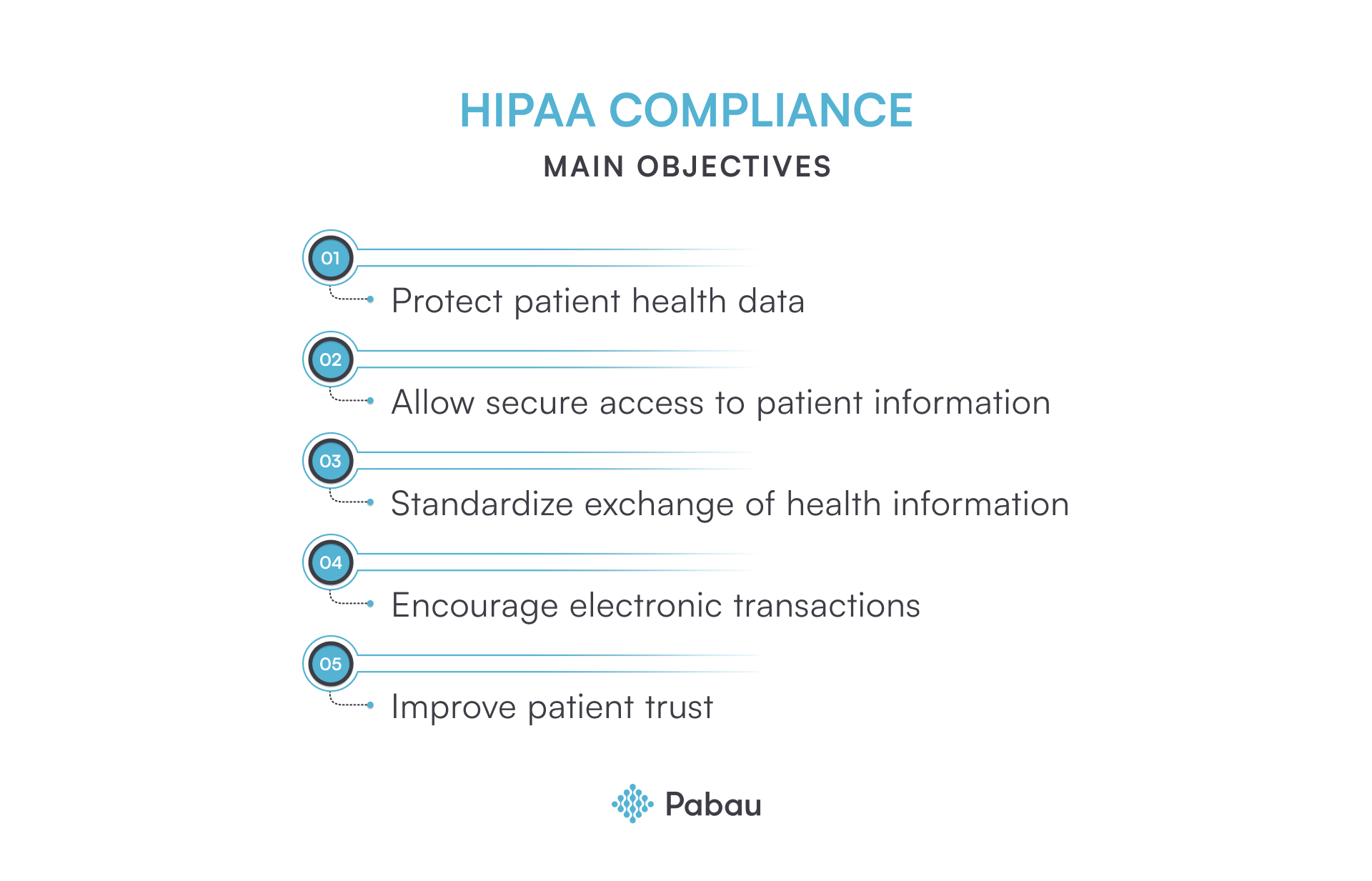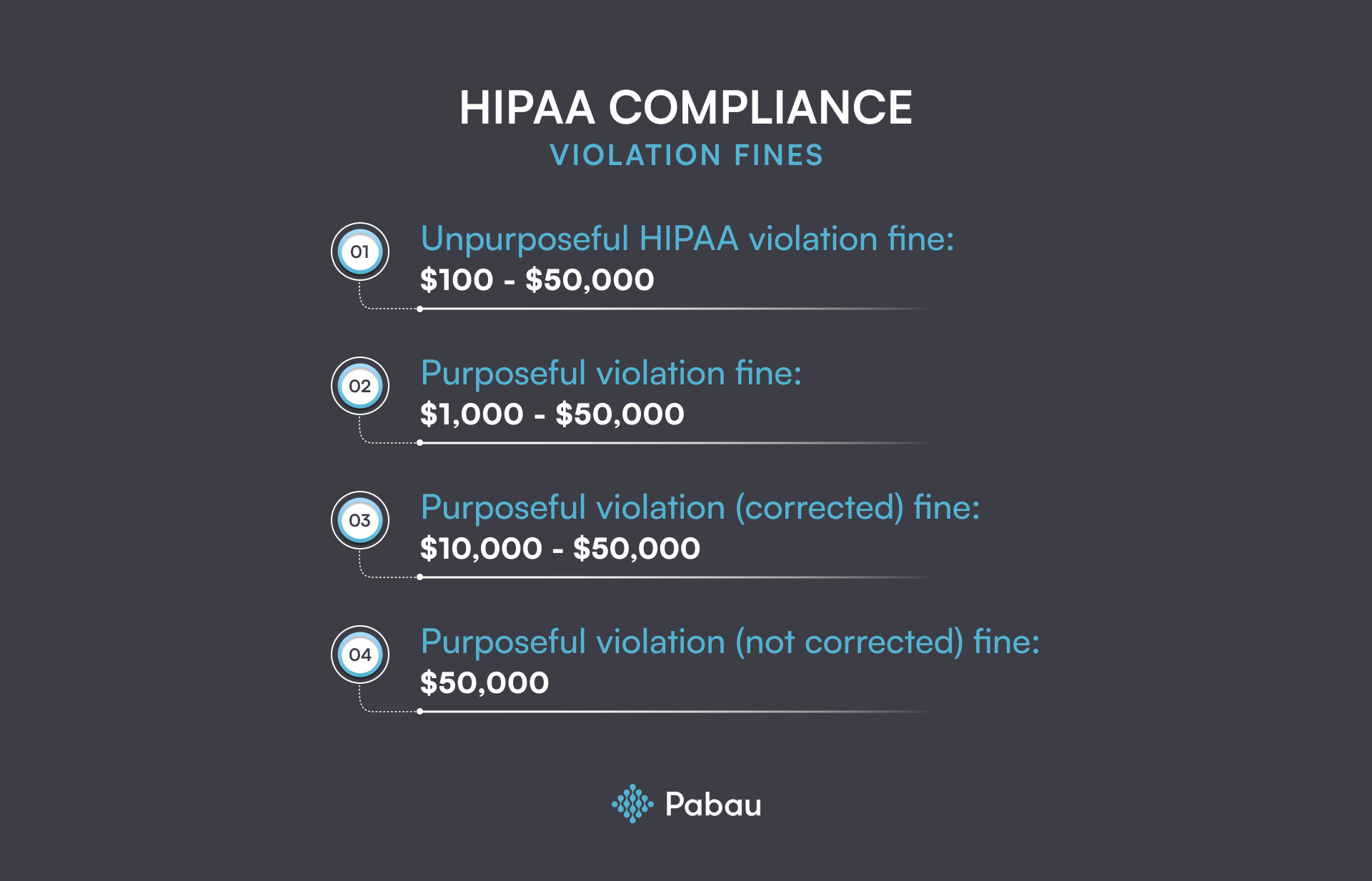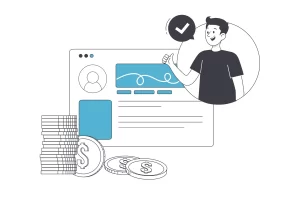HIPAA. HIPAA regulations. HIPAA compliance. HIPAA obligations. Sounds familiar?
If you’re a medical spa or healthcare practice, you’ve probably heard about HIPAA. And you’ve heard it for a good reason because HIPAA compliance is not only a must-know, it’s also a must-implement regulation for all US healthcare organizations.
You might have implemented different security measures by now, such as 2FA authentication. But when protecting sensitive patient data, be it patient IDs or treatment details, HIPAA is the only US regulation to legally enable and demand this.
Navigating compliance for your medspa can be tricky, but it’s necessary to do. To make things easier, we compiled a comprehensive guide on what HIPAA compliance is, why you need it, how to follow it accordingly, and how Pabau can help.
We also included a HIPAA checklist to navigate your compliance like a pro — get it for FREE.
Now, let’s start from the top.

Understanding HIPAA: basics for medical spas
HIPAA, or the Health Insurance Portability and Accountability Act, is a federal law designed to safeguard sensitive patient data in the United States. HIPAA compliance is mandatory for medical spas that handle physical and electronic Protected Health Information (ePHI/PHI), including personal client details (e.g. name, address, ID number) and treatment details (e.g. medical records, facial images, notes).
For medical spas, HIPAA outlines several compliance rules, with a particular focus on security and privacy.
- The HIPAA Privacy Rule governs how medical spas maintain the confidentiality of patient data. It dictates how you control access to sensitive information, who you give access to PHI (practitioners, managers…), and how your patients are notified about it.
- The HIPAA Security Rule controls how medical spas apply the rule’s administrative, physical, and technical safeguards. These include processes like performing risk assessments, encryptions, and securing devices and facilities that store PHI.
Overall, medical spas need to comply with HIPAA to properly handle patient records, secure virtual consultations, and share PHI safely, be it with staff or patients.

A HIPAA checklist for medical spas
Managing HIPAA compliance can be complex, especially if it’s your first time doing it.
Whether due to neglect or oversight, violating HIPAA compliance in any way can break your patients’ trust, damage your reputation, and make you subject to fines.
To prevent these risks and ensure full-on compliance, we created a handy guide.
1. Appoint a HIPAA compliance officer
First things first, you have to appoint a compliance officer. Typically, a compliance officer will be a covered entity, like an employee at your practice, or a business associate with whom you collaborate. They will oversee HIPAA compliance, making sure security and privacy rules are followed, and that employee training is provided. If you are a bigger med spa, you may need to appoint more than one compliance officer.
2. Develop security management policies and standards
HIPAA compliance is all about documentation. You must create HIPAA-friendly procedures that ensure private, secure, and breach-free PHI management. Some of these can include managing the disclosure of PHI with regulated access, doing data backups, and risk recovery. Your HIPAA compliance officer will be responsible for creating this documentation and reports, including the following:
🟦 HIPAA risk analysis and risk management plan
🟦 Notice of privacy practices
🟦 Employee training logs and sanction policy
🟦 Contracts and agreements with vendors
🟦 Work desk procedures and physical security records
🟦 Password policies and breach response plan
🟦 Compliance process, procedures, and assessment reports
🟦 Blueprint of your office facility and PHI map (e.g., location documentation)
🟦 Electronic media and hardware storing PHI
🟦 Incident documentation and disaster recovery plan
🟦 Authorizations for disclosing sensitive information
3. Manage PHI access for business associates
Sometimes, business associates may come into contact with your practice’s PHI. Just like covered entities (your practice or salon), business associates (like your accountants) will also be obligated to protect the patient data they deal with. You will also need to sign a legal business associate agreement (BAA) to ensure that your PHI is secure at all times, from all sides.
4. Implement safeguards of the HIPAA Security Rule
To protect PHI all the way, the HIPAA Security Rule imposes three safeguards — administrative, physical, and technical.
- Administrative safeguards help healthcare providers properly use and store PHI. Violations can be caused by someone speaking too loudly on the phone or sharing something on social media that they shouldn’t.
- Physical safeguards protect physical access to PHI, helping employees manage their workstations and devices securely. An example of a physical safeguard is limiting physical access to surveillance cameras or iPads.
- Technical safeguards protect you against unauthorized access to PHI stored in different applications. Antivirus software and data encryption are some technical safeguards you might need to consider.
5. Perform risk assessments
As a complying medical spa, you’ll need to perform regular HIPAA risk assessments to detect any risks of cyber-attacks and data breaches. While risk assessments are mandatory, how you conduct them is entirely up to you, but should include the following steps:
🟦 Determine where PHI is stored and shared
🟦 Detect potential PHI threats and liabilities
🟦 Analyze how and if your existing security measures can help
🟦 Document any vulnerabilities or potential risk factors
🟦 Determine risk levels for each threat
🟦 Address the most likely and impactful security risks
🟦 Review and update risk analysis regularly
6. Train employees on HIPAA procedures
HIPAA compliance training is mandatory for all medspa, clinic, or salon teams and the BAs who handle their PHI. Through HIPAA training, teams can better understand how compliance works, why it matters, and what non-compliance looks like.
Ideally, you should enforce HIPAA training annually for the whole team and as part of the onboarding process for new employees. For successful training, ensure your employees are aware of all existing compliance policies, potential violations, and emergency protocols.
7. Address threats immediately and improve
Businesses need an average of 197 days to identify security threats, and 69 days to resolve them. This is a very long time to leave sensitive patient data out in the open.
As a comparison, businesses that addressed and resolved a breach in less than 30 days managed to save over $1 million. This makes quick responses to threats crucial. Whenever a breach occurs, you must conduct a thorough investigation to determine the underlying causes. Also, impose stronger controls when resolving data threats, to prevent similar issues.
Be safe, not sorry — learn more about HIPAA violations to address issues head-on!
8. Regular monitoring and security policy updates
Regularly monitoring compliance policies prevents costly HIPAA violations and enhances data protection. To better monitor HIPAA compliance, you’ll need to enforce:
🟦 Regular data security and HIPAA audits
🟦 Automated policy checks
🟦 Employee training programs
🟦 Incident response and reporting
🟦 Encryption & access controls
By regularly tracking HIPAA compliance, you’ll boost data protection, ensure legal adherence, and minimize the risk of breaches. In turn, you will build trust among patients and protect your business legally, and financially.
Common HIPAA violations that can be avoided by having a checklist
A straightforward checklist can be a game-changer for avoiding HIPAA compliance slip-ups. Let’s explore a few common HIPAA violations and see how a compliance checklist can prevent them.
Viewing health care records without permission
The more people can access your PHI, the bigger the risk of mishandling that data. To sidestep this common HIPAA violation, it’s crucial to regulate access to client data.
A HIPAA compliance checklist can help you take all steps to securely manage sensitive patient information, minimizing the risk of critical data exposure.
Failing to perform an organization-wide risk analysis
Conducting a thorough risk analysis for your medical spa is better than dealing with the aftermath of a security breach. Doing regular risk analysis not only helps you identify and prevent potential breaches but also protects you from committing HIPAA violations. The good thing is, you don’t have to do homework alone.
A compliance checklist can easily guide you in carrying out a successful and timely risk analysis that aligns with HIPAA standards.
Ignoring security breaches or risks
Security breaches can happen unexpectedly — devices get stolen, patient emails can be accidentally sent to the wrong person, and paper records go missing. However, overlooking such breaches is a significant HIPAA violation. That’s where a compliance checklist ensures you can cover all security bases, like learning where breaches might occur, how to spot them, and when to take action to address them.
Restricting client access to their health records
No matter how well you secure sensitive data from others, your patients will always have the right to their own health information. Violating this right can make your medical spa look unreliable and might cause patients to file a HIPAA complaint with the Office for Civil Rights (OCR). The great thing about having a compliance checklist is that you can learn how to easily set up a way for patients to securely access their records.
Unauthorized disposing of PHI
Avoiding HIPAA violations isn’t just about how well you protect PHI, but also about how well you dispose of it. Whether you’re dealing with paper or digital records, a HIPAA checklist can guide you on how to properly destroy patient information that you don’t manage anymore, so you can be sure there are no sensitive details left out in the open.
Potential HIPAA violation penalties
Violating HIPAA can happen even without you realizing you’re doing it. The best way to prevent them is by fulfilling all HIPAA regulations. For one, you’ll need to keep patient information — personal and treatment-related — secure, while also informing your clients how their data is used and protected.
You’ll also need to keep any device or location storing patient data protected, granting access only to authorized members or staff. Finally, running regular reports can help you detect any compliance vulnerabilities early on.
Without protective measures, HIPAA might look into your compliance efforts. Or worse, a patient might notice you handled their data wrongly and file a complaint against your clinic, alarming HIPAA to launch an investigation.
Social media and in-person interactions with patients can also be subject to violations. For example, revealing patient information online or while they’re in the waiting room (like, “Your laser results are looking fabulous!”), is directly violating your compliance.
It’s the same with any patient images (yes, even intentionally blurred ones!) that you manage. Sharing them without consent might trigger patients to report your violation.
Breaking HIPAA’s rules can lead to huge fines, from $100 to millions, depending on the violation severity and intention behind it. Here are the potential HIPAA violations and fines:

Does Pabau support HIPAA compliance for medical spas?
Yes, Pabau supports HIPAA compliance for all US-based healthcare businesses that need to adhere to HIPAA regulations. However, keep in mind that supporting HIPAA compliance and enforcing it are two different things.
Enforcing HIPAA compliance includes several steps that medical spas need to fulfill on their own, from reporting to risk analysis. Pabau, on the other hand, helps maintain your compliance within the system. To support your HIPAA compliance, Pabau has various features you can activate from your account, in the dedicated HIPAA compliance field.
Go to Setup➡️Business details➡️Security. Click on HIPAA Compliance Support to enable it — all done!

The benefits of Pabau HIPAA compliance for medical spas
HIPAA compliance allows Pabau clinics and salons to give patients greater control of their data. It also regulates how patient EHRs will be managed. Let’s go over the key ways Pabau can support HIPAA compliance.
1. Easier compliance management
You can easily take charge of your HIPAA compliance and manage various compliance aspects, like your paperwork. Your health information will stay safe, making document management a breeze. By enabling HIPAA from your Pabau security settings, you can activate your compliance, and never worry about it again.
Keep in mind that to ensure full-on support, from Pabau your practice has to meet all HIPAA compliance requirements on its own.
2. Secure online booking and sharing
Pabau HIPAA compliance makes online bookings safer. It protects personal health information (PHI) shared during online bookings and reduces the risk of unauthorized access. The same security also applies to patient health plans, lab results, files, and medical history details.
With Pabau, you can safely share before-after photos with patients via secure emails, monitor their journey via iPad, and manage consent forms.
3. Data encryption, secure storage, and access control
Pabau uses special encryption protocols to keep patient information safe, from medical records to contact details. You can also set up access controls, making sure that only selected people can see sensitive patient information, like specific doctors, for example.
Alongside HIPAA support, Pabau also allows you to do regular data backups and enforce disaster recovery protocols to minimize any security risks.
4. Audit logs
Audit logs are key for maintaining your HIPAA compliance. They make it easier to see who accessed specific data, like that on patient appointments, what actions they took, and what information they viewed.
With Pabau, everything is done for you, so you can keep a close eye on how users manage sensitive appointment information (like the reason for the visit, patient treatment plans, costs, etc.). Having detailed records of your findings is great for detecting any security incidents fast, and making sure your medspa is fully compliant.
Looking for an easy way to become HIPAA compliant? Try Pabau today
Streamlining your HIPAA compliance with Pabau is as easy as a few clicks!
What you need to stay HIPAA compliant is software like Pabau. This is because it offers advanced security features, including authorized access, multi-layered encryption, and 2-factor authentication, help support your HIPAA compliance efforts, ensuring your client records are securely stored.
For added cybersecurity, Pabau lets you set up automated session timeouts and run regular audits on appointments, so you can securely handle them, controlling authorized access to them. Put your compliance in motion — enable HIPAA compliance support from your Pabau account, and it will run seamlessly in the background!
If you’re just starting your HIPAA journey or want to improve your compliance, download Pabau’s complete HIPAA compliance checklist for medical spas or book a demo today!





